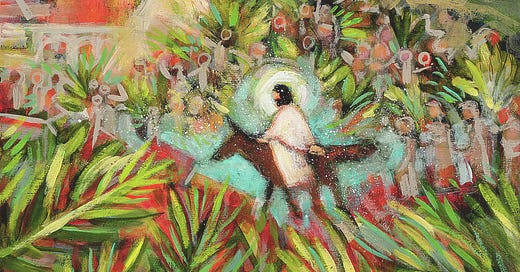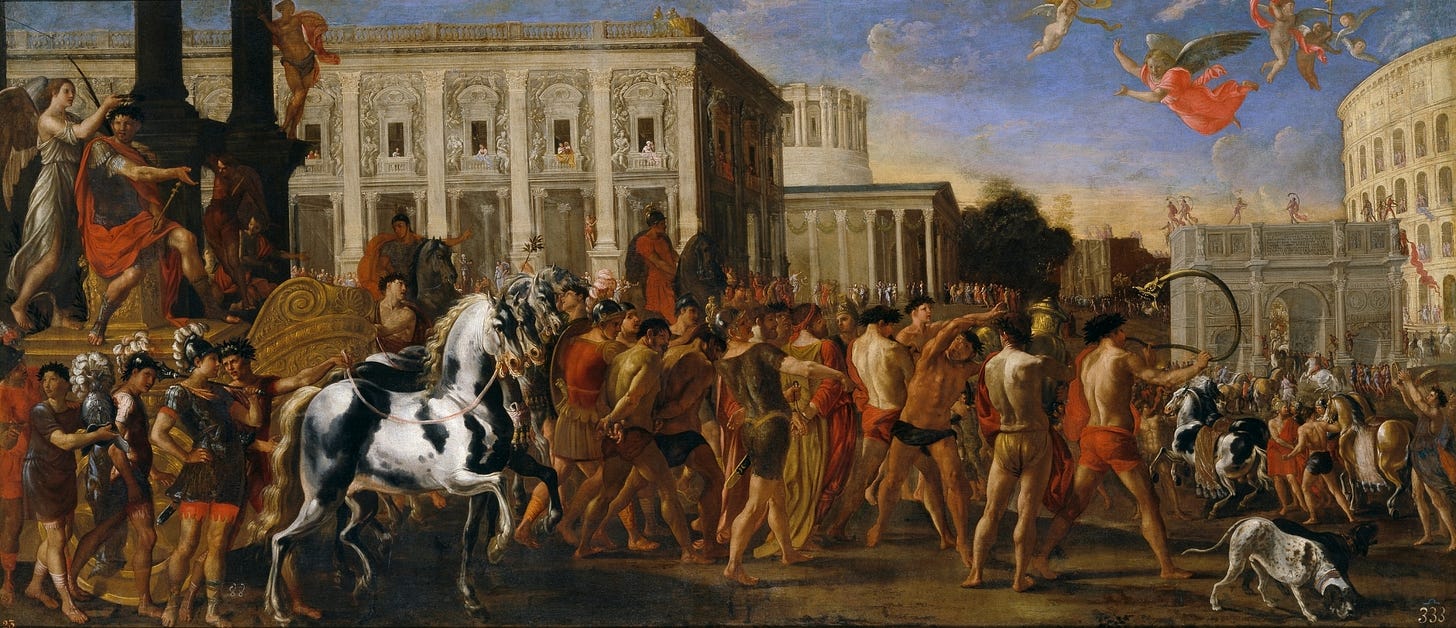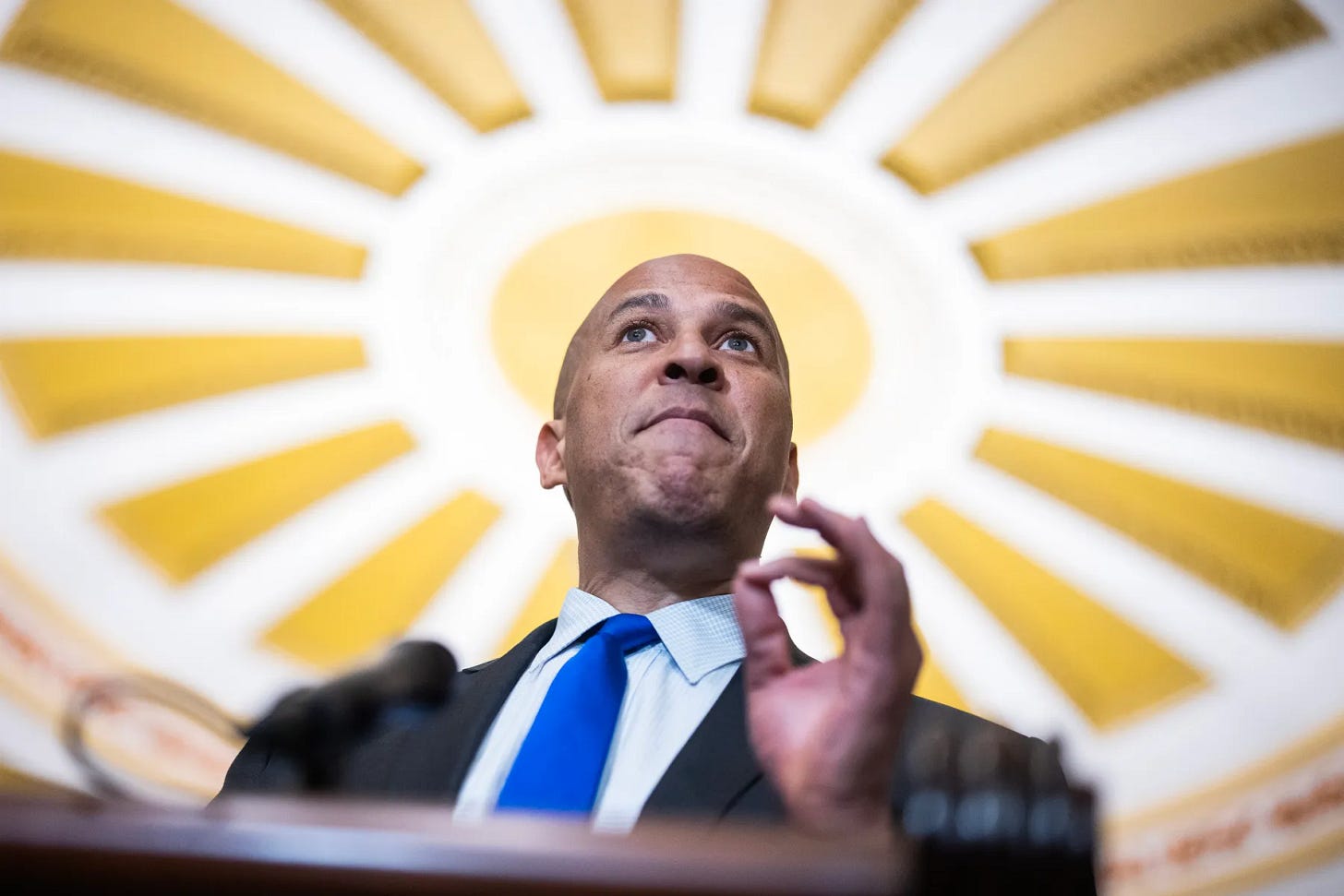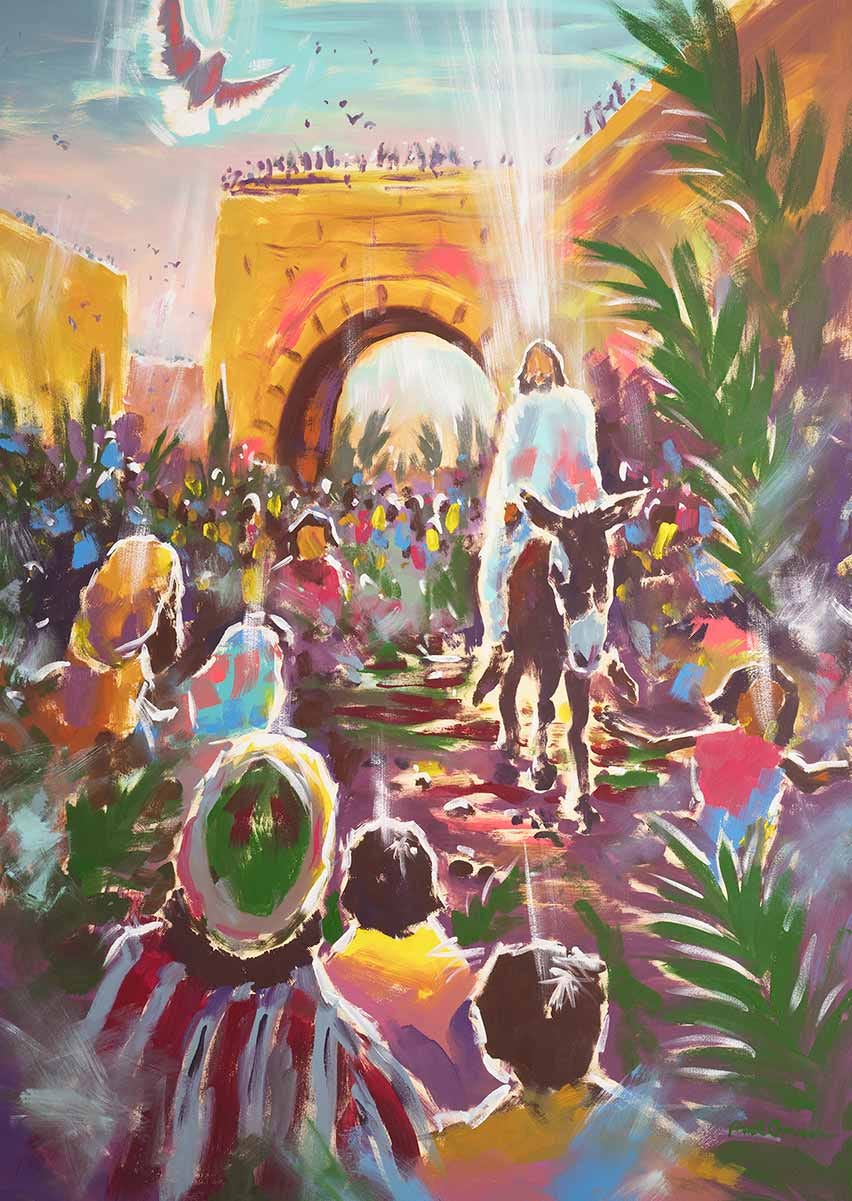The Time Jesus Staged a Protest March
Palm Sunday, Political Theater, 25-Hour Speeches, and Protesting the Empire
Matthew 21:7-10
They brought the donkey and the colt and put on them their cloaks, and he sat on them.
Most of the crowd spread their cloaks on the road, and others cut branches from the trees and spread them on the road.
And the crowds that went before him and that followed him were shouting, “Hosanna to the Son of David! Blessed is he who comes in the name of the Lord! Hosanna in the highest!”
And when he entered Jerusalem, the whole city was stirred up, saying, “Who is this?”
As a child, Palm Sunday was my favorite Sunday of the year. Growing up, my dad pastored a fundamentalist Baptist church in a neighborhood in Queens, mostly made up of Caribbean immigrants. On Palm Sunday the Jamaican women wore their second most ornate hats—the best were for Easter the following week—and passed out palms at the door. I would get as many as I could! I’d spin them, toss them, use them as swords. During the singing, the whole church waved branches and shouted “Hosanna!” just as we imagined they did in the first century, welcoming Jesus into Jerusalem.
If you grew up in church like me, you may have sentimental images attached to moments like this one, but these can actually obscure the radical truth of what was happening.
Political Theater of the Highest Order
Jesus’ entry into Jerusalem wasn’t a spontaneous celebration. In this story, Jesus is at his most deliberate and strategic. This is political theater of the highest order—he stages a protest meant to arrest the attention of the empire and the systems of domination centered in Jerusalem.
It was closer to a riot than a church service.
And a “triumphal entry” wasn’t a new idea Jesus invented. Conquering kings had staged these political spectacles for centuries. When the Roman Empire won a great victory, Caesar would return to Rome to a triumphal procession, with crowds waving branches and tossing flowers before him. Think of Commodus in Gladiator, entering on a chariot as the people cheer their conquering hero.
Jesus intentionally parodies the Empire’s pomp. It’s a brilliant subversion—deliberate, disruptive, and drenched in meaning.
It was an announcement that a new kingdom is coming—that the empire is a sham, and on its way out.
The people waving branches weren’t performing a pious ritual. They were peasants crying out for material deliverance. They wanted Jesus to turn the world upside down.
As Drew Hart puts it, “each branch or cloak that was laid down before [Jesus] represented the desire to break free from captivity to the status quo.”
In each of the Synoptic Gospels, Jesus moves directly from the triumphal entry to the temple, concluding his demonstration with an act of civil disobedience that would have many modern conservatives calling for his arrest. These were planned protests—not unlike King’s march on Selma or the lunch-counter sit-ins of the Civil Rights Movement. Jesus was making a visceral statement.
How does seeing Jesus this way change your understanding of Holy Week?
It certainly makes Jesus’ death more understandable.
Rome—like Sheriff Bull Connor, like every empire—doesn’t take kindly to rebellion.
A 25-hour speech against the empire
In the 2000 years since Jesus’ radical political statement, the need for a bold public protest to empire has not gone away. In fact, in just the last few weeks we had a great modern example of the power of political theater.
On March 31, 2025, Senator Cory Booker made history with the longest speech ever recorded in the U.S. Senate: over 25 hours, protesting Donald Trump and Elon Musk’s dismantling of democracy. The speech required fasting, preparation, and stamina. His team compiled binders of data so every moment was substantive. It was a passionate, disruptive cry to wake people up. It worked—it dominated the news, grabbed the nation’s attention, and reminded us of what’s at stake.
But soon after, critics called it “performative.”
We don’t need speeches, they said. We need material change.
And yet—even critics had to admit—it made us pay attention.
It pulled us out of our stupor.
If there was ever a time to fast, and compile binders, and pull out all the stops, it’s now. Booker reminded us what time it was—how high the stakes truly are.
Performance isn’t always empty. Symbolism can awaken the imagination and rattle sleeping consciences. As Hope Giselle-Godsey put it, “Before you mock a 24-hour speech, ask yourself: when was the last time you stood up for something for even 24 minutes?”
Well-orchestrated acts of resistance may not change the system overnight, but they can pull back the curtain. They show us that the emperor has no clothes. They remind us that another world is possible, and they summon us to action of our own.
Jesus’ action—like Booker’s—shook the imagination of those under the boot of the empire, reminding them that another world was possible.
Wake up. The kingdom is coming. Do you feel it? Do you see it? Do you long for it?
Not just another King
But there is another essential element to Jesus’s protest march.
Although Jesus used the form of a Roman triumphal entry, he inverted the substance.
He didn’t ride in on a war chariot—but on a donkey.
Rejoice greatly, Daughter Zion! Shout, Daughter Jerusalem!
See, your king comes to you, righteous and victorious,
lowly and riding on a donkey…- Zech 9:9
He was fulfilling Scripture, but not in the way they expected.
This wasn't just another Caesar, entering on a new chariot. This was an entirely different kind of king.
The text goes on:
I will take away the chariots from Ephraim
and the warhorses from Jerusalem,
and the battle bow will be broken.
He will proclaim peace to the nations.- Zech 9:10
Jesus wasn’t ushering in a new empire.
He was proclaiming the end of empire.
Not another warlord, but a nonviolent messiah.
And this is not empty performative activism. Jesus follows through, as politicians so seldom do.
Booker’s speech was worthy of attention, but within days, he voted to continue arming Israel—an apartheid state carrying out a genocide in Gaza—while still receiving campaign funds from AIPAC.
We are so used to politicians giving us brief glimpses of courage, only to disappoint. I can’t be too critical of him though; I understand the fear of stepping out of security and the status quo. If Booker withdrew his support for Israel, he could be facing a political crucifixion.
Well.
Booker does claim to be a Christian—isn’t crucifixion a part of the deal?
Christians love to say we follow Jesus. But do we really know what we’re saying?
The cross was not a metaphor
Before Jesus marched into Jerusalem, he told his disciples to take up their crosses to follow him. In that day, the cross wasn’t spiritual poetry—it was a device for state execution.
The paradox and demand of following Jesus is that the path towards liberation will usually be a path of suffering. When we join Jesus in disruptive protest against empire, the empire strikes back.
Martin Luther King would also often tell his leaders prior to marches that they should be prepared to endure violence. King expected he would ultimately be killed. He knew they needed to be prepared to bear the cross.
If we choose this path of nonviolence, if we stand with the marginalized, if we confront and oppose systems of death—those death-dealing systems may come for us.
I don’t claim to follow Jesus perfectly.
But Holy Week haunts me.
Because I may criticize Booker…
…but I know I, too, wave the palm branch and resist the cross.
I love the performance. I shrink from the sacrifice.
And yet, the Spirit of Jesus does not give up on us.
Still he invites us—again and again—to follow.
To march into the city.
To weep over what is broken.
To protest what is causing death.
To suffer for the sake of love.
And maybe—just maybe—to rise again into something new.
the battle bow will be broken.
He will proclaim peace to the nations.
Are we willing to go with him?
As you complete this breath prayer, imagine Jesus giving a speech of invitation and preparation to everyone about to join him on his march into Jerusalem.
He asks you if you are prepared to carry your cross. What does that mean for you?
Inhale: He proclaims peace to the nations
Exhale: Blessed is the one who comes in the name of the LordInhale: Give me courage to join him there
Exhale: Blessed is the one who comes in the name of the Lord









My mother's favorite Catholic holiday was Palm Sunday because she said, "It was the time Jesus showed us that sometimes righteous indignation is the proper response." She was a Catholic Worker type whose whole life was about shaking her fists in the face of the powerful. She loved that Jesus had "turned over the money changer's tables," a fact that she thought showed just what he thought of the monied and greedy class. She also died on Palm Sunday, a day I felt she had chosen.
Holy, holy! I am God-smacked. What a powerful message in times like these. And this especially, brought me to tears, "…but I know I, too, wave the palm branch and resist the cross.
I love the performance. I shrink from the sacrifice.
And yet, the Spirit of Jesus does not give up on us.
Still he invites us—again and again—to follow."
When we feel vulnerable and weak, hold fast in the never ending hope and Spirit of Jesus.